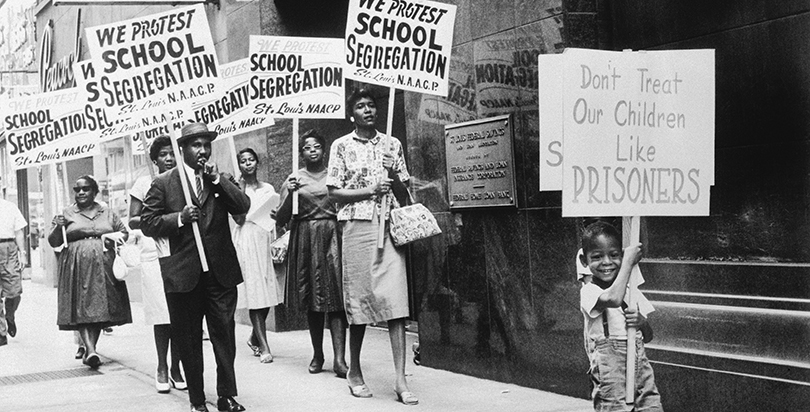NAACP May Double Down on Charter School Opposition as Civil Rights Allies Strongly Disagree

The NAACP may soon have one message for state governments and others looking to expand charter schools in urban communities: don’t.
During its 2016 National Convention last month, the group’s delegates passed a resolution that reaffirmed the association’s opposition to spending public money on charter schools but went a step further by calling for a full moratorium on their “rapid proliferation,” NAACP interim education director Victor Goode confirmed Tuesday.
Before becoming official policy, the NAACP’s resolution must first be ratified by its national board, scheduled to meet in the fall. Julian Vasquez Heilig, a professor of education leadership and education chair of the NAACP’s California State Conference, is in favor of hitting the pause button.
“I think what the NAACP is saying is we need to stop and take stock,” he said. “It doesn’t say we need to abolish charter schools but we need to reevaluate where we are with charter schools right now.”
As news of the NAACP’s proposed resolution circulated on progressive blogs, Twitter and other outlets, the disparate reactions revealed deep divisions among civil rights groups and education leaders over the role charter schools should play in serving kids of color.
“They couldn’t be more out of touch if they ran full speed in the other direction,” Steve Perry, founder of Capital Preparatory Magnet School in Hartford, Connecticut told Roland Martin Tuesday on Martin’s show, NewsOne Now. “Americans are deciding with their feet that they want to go to better schools.”
But Hilary Shelton, director of the NAACP's Washington bureau, said on Martin’s show that charter schools are not up to par because they have become tools of segregation and hire teachers who don’t have degrees.
“We have charter schools that were carpetbaggers,” he said. “They come in and before they can figure out the charter school was not prepared to provide the services, the charter school was gone.”
In 2010, the NAACP passed a resolution that rejected “the emphasis” on charter schools and in 2014 the group passed another saying it opposed the “privatization of public schools.”
The newest resolution, a copy of which was first posted on the Cloaking Inequity blog, calls for legislation that would put parents on the advisory boards of charter schools and strengthen the investigative powers of government agencies that oversee them.
In the proposed resolution, the NAACP delegates cited concerns that charter schools deepen the segregation of public schools, disproportionately use highly punitive or exclusionary discipline practices and deprive public schools of resources. The resolution even refers to warnings from researchers who argue that charter school expansion in low-income communities mirrors the predatory lending practices that led to the subprime mortgage crisis.
“Weak oversight of charter schools puts students and communities at risk of harm, public funds at risk of being wasted and further erodes local control of public education," the resolution reads.
The idea that charter schools harm the students who remain in the traditional public schools is not supported by research but there is evidence that charter expansion can have negative impacts on school districts’ finances. Meanwhile, a recent report by UCLA’s Civil Rights Project shows that charter schools are more likely to suspend kids of color than white students but at similar rates to traditional public schools. A series of studies from CREDO at Stanford University have found that in the aggregate charter schools don’t perform better than traditional public schools but often outperform them in urban areas.
“The thing is the evidence is mixed. If you are going to invest hundreds of millions of dollars you would think you would want it be on something that knocks it out of the park,” said Heilig, the California education chair who said he was not speaking as a representative of the NAACP. “Pre-K knocks it out of the park.”
While civil rights groups and leaders often agree that poor and minority children are more likely to receive a substandard education, they diverge on whether charter schools provide a sound alternative. Some say the schools give poor children and kids of color who would otherwise be trapped in a failing school a better option.
“I have the upmost respect for the NAACP. The NAACP has produced historic change for folks of color,” said Shavar Jeffries, president of Democrats for Education Reform. “We have tens of thousands of families of color flocking to charter schools and voting with their feet … This moratorium would take choices away from parents.”
Jeffries argued that while there might be some charter schools that are not successfully serving students, the answer is to shut down the bad ones, not put forth a blanket ban on their expansion. If anything, there should be a moratorium on failing traditional public schools, he said.
Even some groups that have teamed up with the NAACP to advocate for stronger accountability measures in the rewrite of the No Child Left Behind Act, depart from the group on the charter school issue. The National Council of La Raza, a Latino civil rights group, continues to support the expansion of charters schools and even supported a bill in 2014 that would have steered an additional $50 million towards them.
But the NAACP noted in its resolution that it joins Journey 4 Justice, a national coalition of community organizations that has been particularly active in Chicago, and other groups in calling for a freeze on charter schools. And on Monday, a handful of organizations affiliated with the Black Lives Matter movement released an agenda, which among many things also called for a moratorium on charter schools and school closures.
The debate among civil rights groups is far from over. Goode, the NAACP education director, said the group’s position on charters may continue to affect its advocacy in local policy debates. Those could include continuing to fight efforts to lift the charter school cap in Massachusetts or opposing the tax credit scholarship program in Florida, which gives tax breaks to companies that contribute money to send needy kids to private schools.
(The 74: All Over the Cap: The Fight for the Future of Massachusetts’ Charter Schools)
“The NAACP has historically taken a position in support of public schools,” Adora Obi Nweze, president of the Florida State Conference of the NAACP, told The 74 last year. “We don’t support any effort to drain money from public schools. And while it (the scholarship program) in fact, does try to support the best form of education for students, research has not proven that.”
Get stories like these delivered straight to your inbox. Sign up for The 74 Newsletter

;)
